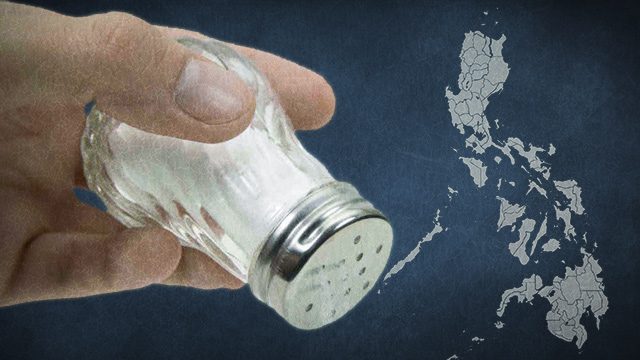SUMMARY
This is AI generated summarization, which may have errors. For context, always refer to the full article.

MANILA, Philippines – Iodine deficiency is a “silent but tremendous” nutritional problem as it can greatly risk the health and lives of children.
Iodine is an important dietary nutrient needed to produce thyroid hormones which are essential for development and metabolism.
According to the World Health Organization (WHO), iodine deficiency can risk the mental health of children or worse, their survival. During pregnancy, serious deficiency can result to stillbirth and congenital abnormalities.
In the Philippines, the results 8th National Nutritional Survey (NNS) show that 8.9% of all children aged 6 to 12 years old in 2013 has Iodine Deficiency Disorder (IDD). It is lower than 2008’s 13.8%.
Addressing challenges
Despite the decreasing number of people suffering from IDD, the National Nutrition Council-National Capital Region (NNC-NCR) believes that there still a need to strengthen the implementation of ASIN Law.
ASIN Law, signed as Republic Act No. 8172 in 1995 by then President Fidel V. Ramos, aims to promote the use of iodized salt to address the lack of micronutrients in the country. It also requires all salt manufacturers to iodize the salts they produce and distribute.
However, after 20 years since first implemented, Dr. Amelia C Medina of the Department of Health-National Capital Region Disease Prevention and Control believes that is now the time for stakeholders to assess the program and point out the challenges it faces.
One of these challenges, Medina cited, is the monitoring of supply and distribution of adequately-iodized salt within Metro Manila.
Other challenges are as follows:
-
No established monitoring team in the many entry points of salt delivery
- No regular supply of salt testing kits which hinders submission of LGU reports
- Rapid testing kit only detects the presence of iodine, not quantity
- Industrial salt is being passed as salt for human consumption because industrial salts are not required to be iodized
- No monitoring from the regional level due to lack of manpower
According to Regional Nutrition Program Coordinator Milagros Federizo, the campaign could be intensified by the collective efforts continuously done by stakeholders such as local government units.
“We should all work together to eliminate it by pushing for strict compliance with law and ensuring that all households use adequately-iodized salt,” she emphasized.
The need for Bantay Asin Task Force
To address the challenges, LGUs need to organize or revitalize their Bantay Asin Task Forces (BATF).
Members of BATF are responsible in managing and coordinating the National Salt Iodization Program (NSIP) to their assigned regions, cities, and municipalities.
BATF also needs to ensure that salt distributed and sold to the public have at least between 30% to 70% per parts million (ppm) of iodine content.
It seems, however, that not all areas have a working BATF.
In Metro Manila, NNC-NCR pointed out that only 4 LGUs have an organized and active Local BATF: San Juan, Manila, Pasay, and Navotas. Paranaque and Mandaluyong have an organized forces but are inactive.
Meanwhile, the monitoring in the remaining LGUs are on the shoulders of Barangay Nutrition Scholars (BNS).
Raising awareness
In 2013, 79% of all Filipino households are aware of iodized salt. However, only 41% said that they use it.
Aside from letting the public know of its existence, it is also highly important raise awareness on the importance of using iodized salt and the health risks that comes with Iodine deficiency.
The NNC reccomends that the promotion of Iodized salt utilization should be done regulary. It should be part of the “regular service delivery” of all health centers.
In addition, BNS should include educating heads of households whenever they go out to the field. – Rappler.com
Add a comment
How does this make you feel?
There are no comments yet. Add your comment to start the conversation.